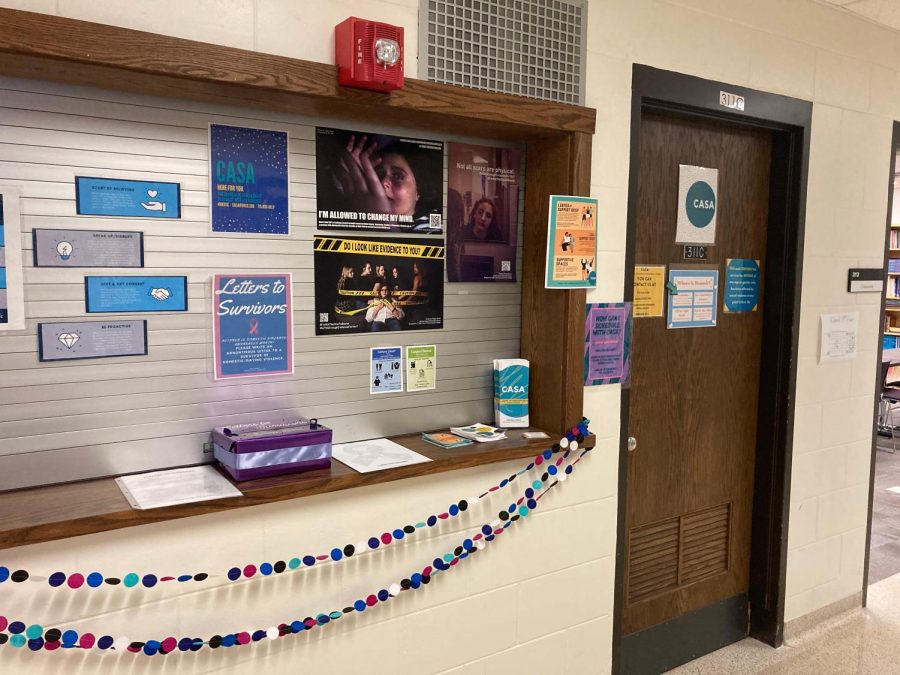Annual Security Report released, programs discuss resources and responses
Campus police, Housing and CASA discuss Sexual Assault Awareness and resources available
Photo by Elliot Adams
The CASA Center is located in Hibbard 311A.
Content Warning: This article discusses sexual violence
Editorial Note: For the purpose of clarity, we will refer to those who have faced sexual violence as survivors.
On Friday, Sept. 30, the 2022 Annual Security Report and Annual Fire Safety Report, or ASR, was published to the UW-Eau Claire community. This annual report is released in accordance with the Clery Act and is published by the UW-Eau Claire Police Department.
Additionally, the ASR includes crime data in accordance with the Violence Against Women Act, or VAWA.
According to the Clery Center, VAWA “expands the rights afforded to campus survivors of sexual assault, domestic violence, dating violence and stalking. It also details the role of law enforcement, the types of crime mandated for reporting and stipulates the need for violence prevention programming.”
According to the ASR, three of the categories listed in accordance with VAWA are Rape, Fondling and Stalking. According to campus Police Chief Jay Dobson, the numbers listed for these categories are reported, not actual arrests.
Dobson said that the reason for this is due to differences in reporting. Some reports do come from police responses, however, the majority of reported numbers come from the Dean of Students Office.
Deborah Newman, an associate director in Housing and Residence Life, said that reports come from the Dean of Students Office due to allowing reports to stay anonymous and not involving law enforcement.
“The most important is that the student really should have the right to decide whether or not they want the police to be involved; because it’s tough to go through one of these cases and work through the legal system, and not everybody wants to have that experience,” Newman said.
According to Newman, due to mandatory reporting laws, multiple staff members will have knowledge of sexual violence reports in campus residence halls.
Typically, this will include the resident assistant — if that’s who it was reported to — then the hall director, another hall director if the report involves a student in another residence hall, the housing director and the dean of students, Newman said.
According to the ASR, the numbers for crimes of sexual violence were slightly higher in 2021 as compared to 2020, but are still significantly down from 2019.
Dobson believes reports of sexual violence on campus were lower in 2020 due to COVID-19 and the absence of the student population for significant portions of the year. However, Dobson said that the numbers captured don’t accurately capture all instances of sexual violence on campus.
“It’s not just here, it’s not just Eau Claire, it’s not just Wisconsin, it’s nationwide — if not across the world — that those types of offenses are underreported,” Dobson said. “So I have no delusions that these numbers are not capturing every type of these offenses, that’s just not realistic.”
According to Dobson, he hopes that readers will take more from the ASR than just the numbers.
Dobson said he made emphasis on the ASR to publish a resource-first safety report this year. Part of this emphasis has been publishing a comprehensive list of resources for community members at the beginning of the report, rather than being buried at the end.
He said the campus police have made significant steps to create a more trauma-informed approach to campus safety.
One of these steps, Dobson said, was sending campus officers to a trauma-informed sexual assault investigations course that was sponsored by the Wisconsin Department of Justice.
Another part of this trauma-informed approach has been creating closer relationships with community organizations such as the UW-Eau Claire Center for Awareness of Sexual Assault, or CASA.
Hannah Luedtke, an advocate at CASA, said that campus police have been working to create a closer relationship with CASA by reaching out to her for help with training officers on how to interact with survivors.
An additional service that CASA offers is allowing survivors to talk to law enforcement in the CASA office with an advocate present to create a safe space, said Luedtke.
According to Luedtke, a barrier for survivors of sexual violence in the UW-Eau Claire community is making sense of the complex reporting options.
To help with this, Luedtke said that CASA offers comprehensive education on reporting options as well as providing advocates to work with survivors during court cases and offering to sit with survivors during campus disciplinary hearings.
According to Luedtke, a goal for the CASA office this year is to create more comprehensive programming on sexual violence prevention.
Luedtke said that prevention programming, whether it be posters, education or training, gets published by various campus organizations such as the Dean of Students Office, Student Health Services or Housing and Residence Life.
According to Luedtke, she also wants the CASA office to become more visible and accessible for students.
“One of my main goals is to get people more aware of CASA as a support system,” Luedtke said. “I know seeing Center for Awareness for Sexual Assault can be an intimidating title, so I’m trying to get people to know that the office is here, the support I offer and what things I can do.”
For more information see the Annual Security and Fire Report published on the UW-Eau Claire Campus Police Website.
The CASA Crisis Line can be reached 24/7 at 836-HELP.
Adams can be reached at adamsee7924@uwec.edu.

Elliot Adams is a fourth-year journalism student and this is his third semester at The Spectator. He has an unhealthy obsession with the Sopranos and never misses a chance to mention he lives in a downtown studio apartment.

